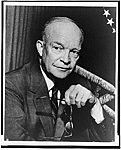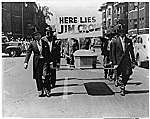Posted on November 5, 2002
All An Act
Dems assault voting rights
by
Daniel Clark
To hear the lip service the Democrats give to the Voting Rights Act of 1965, you'd think they considered it a sacred document. You'd think, from their hysteria over the idea that the act might be allowed to expire in 2007, that they were actually concerned about an actual threat to the voting rights of actual people. You might think, from hearing them use the Voting Rights Act as a platform for election-year posturing, that it was a Democrat-supported law that was enacted as a response to dastardly Republican shenanigans.

You would, in this case, be absolutely wrong. The truth is that the Democrats are cynically using that once vital but now largely anachronistic law as a shield for their voter fraud efforts, and in doing so, are preparing to celebrate an electoral victory by tearing that same, presumably untouchable piece of legislation into confetti.
To get an idea of just how thoroughly dishonest the Democratic Party is being about the Voting Rights Act, we need to go back to the beginning -- which, ironically, is not 1965, but eight years earlier, when Republican President Eisenhower signed the Civil Rights Act of 1957, the first legislative attempt to protect the voting rights of black Americans since the passage of the Fifteenth Amendment. Future president Lyndon Johnson, then the Senate Majority Leader, eviscerated the bill in committee, by stripping it of any enforceable criminal provisions.
Johnson's defenders say that he had to weaken the bill in order to win enough support from the Southern contingent of his own Democratic party to get it passed; and that even a hollow, symbolic voting rights bill was sufficient to act as a pilot hole through which to force stronger measures in later years. His critics charge that he was driven by his own presidential ambitions, and didn't want to hand the Eisenhower-Nixon administration a big legislative victory, when he'd planned to oppose Nixon in the 1960 election. Whatever the case, the fact remains that when black Americans' voting rights were actually under attack from poll taxes, phony literacy tests, and other outrages, it was Democrats who prevented the federal government from implementing a remedy for another eight long, turbulent years.
When Johnson signed the Voting Rights Act during his own administration, he faced little resistance because of the recent, widely televised "Bloody Sunday" incident, in which peaceful civil rights demonstrators in Selma, Alabama had dogs sicced and fire hoses turned on them by police commissioner Eugene "Bull" Conner, a Democrat, who was enforcing Democrat Governor George Wallace's order forbidding the protesters to march. Either out of disgust with what they'd seen, or else out of an acknowledgment of the changing attitudes of their constituents, Southern Democrats voted in favor of the Act in almost the same overwhelming numbers that Republicans did.
Today, the Democrats and their allies in the press cast the Republicans as if they were trying to do to blacks what some Democrats did in the Sixties. One of the ways in which they do this is to refuse to acknowledge the party affiliation of the segregationists, and instead falsely identify them as "conservatives," just because they were opposed by the liberals in their own party, so that casual listeners will then translate "conservative" into "Republican." Another way is that they identify Republicans who oppose racial quotas and preferences as having a "poor record on civil rights," despite the fact that they're actually taking a stand against racial discrimination.

As recently as two years ago, Jesse Jackson and Bill Bradley continued to circulate a ridiculous internet hoax that charged the Republicans with trying to repeal black Americans' right to vote, by allowing the Voting Rights Act to expire in 2007. To be fair, quite a few Democrats have since made a point of it to debunk the hoax, but during the 2000 campaign and its litigious aftermath, the outrageous claims were promiscuously spread without rebuttal.
Black Americans' voting rights are manifested in the Fifteenth Amendment, not the Voting Rights Act, which is just one mechanism for enforcing that amendment. Even if the Voting Rights Act were repealed, which it is never going to be, blacks wouldn't be deprived of their right to vote any more than they were in the Northern states during the Sixties.
Democrats like to foment racial disharmony by denying that any progress has ever been made. In their more outrageous moments, they'll even suggest that not all that much has changed since the days of slavery. Most of the time, they'll at least accept the advances of the Nineteenth Century, but still imagine that we became frozen in time at some point before the moon landing.

Fueled by the opiate of egotism, "civil rights leaders" like Jackson frequently launch into such delusions. The "reverend" invokes memories of Bloody Sunday at every minor dispute. He even declared the Bush v. Gore Supreme Court decision to be "another Selma" ... without all the clubbings and maulings, that is. Nobody was surprised by this hyperbole, though, since Jackson had referred to the Florida butterfly ballot controversy as another Selma just days earlier.
The U.S. Commission on Civil Rights held hearings on the "disenfranchisement" of black voters, and then completely ignored those proceedings' conclusions. The commission, which was created by the Civil Rights Act of 1957, but now serves as a museum for activists still trapped in the Jim Crow era, has essentially become a taxpayer-funded appendage of the Democratic Party. Its chairwoman, Mary Frances Berry, pronounced the election of George W. Bush to be the result of systemic racial oppression, based on unverified and often vague second-hand anecdotes. This directly contradicted the actual findings of her commission's hearings, where not a single witness was produced who was eligible to vote, and was prevented from doing so.
This phony concern for black voters has been used to shield the Democrats' creative electoral tactics from criticism, by linking voter fraud to race, so that any efforts to combat fraud can be called racist. They used this tactic successfully to steal a Senate seat in Louisiana in 1996, in a race that clearly served as their prototype for the 2000 presidential election.
In that Louisiana race, Democrat Mary Landrieu defeated Republican Woody Jenkins by 5,788 votes, one of the narrowest margins ever recorded. Jenkins won a solid majority of the vote throughout most of the state, but Landrieu won the election on the strength of her incredible 100,000 vote advantage in New Orleans, a city with a total population of less than 500,000. Jenkins launched an investigation, which almost immediately found a greater number of phantom votes (7,454) than Landrieu's margin of victory. Moreover, he uncovered methods of fraud which indicated a number of fraudulent votes many times higher.
Jenkins delivered about 8,000 pages of evidence, including affidavits from some of those directly involved in the fraud, to the Senate, which was controlled by the Republicans at the time. When the Senate investigation began to confirm Jenkins' charges, the Republicans panicked, and closed the hearings down. One can only speculate as to their reasons, but the racial deterrent is impossible to ignore.

New Orleans gambling interests had organized a campaign to pass a series of gambling-related ballot initiatives, and to aid Democrat candidates, including President Clinton and senatorial candidate Landrieu. One of their tactics involved the buying of votes from people living in housing projects, from which they were bused throughout the city, sometimes voting as many as fifteen times. The fact that a high percentage of these illegal, paid voters were black meant that throwing their votes out would be characterized by the Democrats as "disenfranchisement." Rather than enter a months-long controversy that would give the Democrats and the press countless opportunities to accuse them of racism, the Republicans lost their stomach for the fight, and sacrificed Woody Jenkins, and the seat that was rightfully his.
In a turn of events that the Republicans should take as a refutation of their concept of pragmatism, their surrender of that seat ultimately led to their loss of the Senate -- which the Democrats now control by one vote -- and very nearly cost them the presidency in 2000. The Bush-Gore election followed the same pattern as the Landrieu-Jenkins race, with the Republican winning a majority of the vote throughout most of the country, and the Democrat racking up staggeringly high margins of victory in major metropolitan areas. In some districts of Detroit and Philadelphia, the two largest cities in the key "battleground states," Gore received a higher number of votes than there were eligible voters. While that's not theoretically impossible, taking into account imperfections in record keeping, it does defy credibility, considering that voter turnout is usually under fifty percent.

This unbelievable Democrat turnout in urban areas brought attention to the busloads of people being driven to the polls in cities like Baltimore, Chicago and Los Angeles. The suspicion is that they were being driven around those cities to vote multiple times, just like in New Orleans, and what else would one suspect? If you live in a major city, how far have you ever had to walk to the polls? Ten blocks, maybe? There's no good reason why an able-bodied person, assuming he only wanted to vote once, would wait around to be taken to the polls on a bus, instead of just going there himself.
This alone may not be compelling evidence of voter fraud, but it falls into a pattern of alarming behavior by Democrat activists nationwide. In St. Louis, they filed a lawsuit to have the polls kept open for hours longer than the law allowed, based on false claims that black voters were being denied the ability to vote, and were unable to have their problems resolved before the legal closing time. It turned out that the plaintiff in the suit had actually been dead for over a year. Still, his complaint was enough to convince a judge to order the polls to stay open, and Democrat voters responded, prodded in part by a recorded phone message from Jesse Jackson.
It wouldn't matter much to most people whether or not the polls were open any longer than usual. Twelve or thirteen hours is usually enough. If you had intended to vote, you would have already done so, and if you were too apathetic to bother voting before eight o'clock, you wouldn't suddenly drop everything to run out and vote between eight and nine. Yet the Democrats, having gotten their deadline extension through fraudulent means, turned out tardy voters in droves ... in another major metropolitan area, in another key battleground state.
Elsewhere, Democrats mailed "voter identification cards" to non-citizens in California, bought votes from bums with cigarettes in Milwaukee, and scoured old folks' homes, homeless shelters and mental wards across the country for malleable-minded people who would vote the way they were told, likely for a price. Then, of course, there was the Florida recount debacle, where Democrats counted punch-card ballots as votes for Al Gore, even if they weren't punched all the way through, and even if there weren't any marks on them at all.
After the Supreme Court halted the Democrats' illegal counting of un-votes in Florida, thus putting an end to their attempted theft of the presidency, Jesse Jackson, relying heavily on public ignorance of history, harumphed, "The same forces that were against the Voting Rights Act of 1965 ... seek to disenfranchise us in 2000 and not want to renew the Voting Rights Act in the year 2007!"

In an effort to prevent a repeat of 2000, the Republicans have assigned election monitors to try to stop poll workers from allowing illegal votes through lax enforcement of election laws. They have good reason to believe that another major coup is in the works, since the Democrats have already added one senatorial candidate, New Jersey's Frank Lautenberg, to the ballot illegally. They've even tried to have absentee ballots that had been cast for the late Minnesota Senator Paul Wellstone counted for his replacement, Walter Mondale, by simply interpreting them as generic Democrat votes.
Democrats have also been caught forging absentee ballots, which one might attribute to a couple isolated, overzealous party activists, if absentee ballot fraud hadn't been such a mundane facet of Democratic Party politics in recent years. One South Dakota Democrat activist named Becky Red-Earth Villella was caught forging absentee ballot applications in the names of deceased and nonexistent people allegedly from Indian reservations. This caused that state's leading Democrat, Senate Majority Leader Tom Daschle, to become furious ... with Republicans. "In my state of South Dakota, we are now seeing a concerted Republican effort to make allegations and launch initiatives intended to suppress Native American voting," he said, caring not that the votes were fraudulent, but only that they were somehow Indian.
In response to Republican efforts to combat such tactics, Democratic National Committee Chairman Terry McAuliffe complained in a press release that, "This dishonors the legacy of all the courageous Americans who fought and died for the Voting Rights Act of 1965. Every man and woman deserves the right to have their voice heard and their vote counted."
Well, every man and woman doesn't deserve that right. Non-citizens, convicted felons and the deceased, for example, have no such rights. What McAuliffe and his party are actually proposing is that anybody who walks through the door of a polling station, or for whom an absentee ballot is submitted, has a right to vote -- even if he's already voted, and even if he's ineligible in the first place. This is the origin of their claim to be defending the Voting Rights Act, a claim that is as fraudulent as any ballot that's ever been forged.
Section 11(b) of the Voting Rights Act says, "No person, whether acting under color of law or otherwise, shall intimidate, threaten, or coerce, or attempt to intimidate, threaten, or coerce any person for voting or attempting to vote." The Democrats are contending that monitoring elections for fraud amounts to intimidation, even if the only people with any reason to feel intimidated are those who are trying to vote illegally.
Certainly, the Voting Rights Act does not consider upholding election laws to be an example of illegal voter intimidation. If it did, that law would not itself forbid voter fraud, which it does, explicitly and profusely. Section 11(c) says "Whoever knowingly or willfully gives false information as to his name, address, or period of residence in the voting district for the purpose of establishing his eligibility to register to vote, or conspires with another individual for the purpose of encouraging his false registration to vote or illegal voting, or pays or offers to pay or accepts payment either for registration to vote or for voting shall be fined not more than $10,000 or imprisoned not more than five years, or both."
Likewise, Section 11(d) says "Whoever knowingly and willfully falsifies or conceals a material fact, or makes any false, fictitious, or fraudulent statements or representations, or makes or uses any false writing or document knowing the same to contain any false, fictitious, or fraudulent statement or entry, shall be fined not more than $10,000 or imprisoned not more than five years, or both." Sounds rather intimidating, doesn't it?
There's a reason why a law designed to protect black citizens' voting rights would also forbid voter fraud. Fraudulent votes dilute the value of every legitimate vote, regardless of the color of the voter who cast it. What the Democrats are showing, by identifying fraudulent votes with blacks, Hispanic immigrants, and American Indians, is that they care little of the voting rights of each individual person, just as long as the monolithic entity they spuriously call The Minority Vote continues to grow.
The Shinbone: The Frontier of the Free Press
Mailbag . Issue Index . Politimals